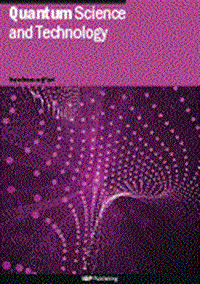基于量子架构和混合技术的统一稀疏优化
IF 5
2区 物理与天体物理
Q1 PHYSICS, MULTIDISCIPLINARY
引用次数: 0
摘要
在一个技术飞速发展和数据空前泛滥的时代,稀疏性已经成为一个重要的属性,在各个领域都有着深远的影响。稀疏性的一个重要应用是稀疏信号恢复,它涉及到从有限的观测中重建信号,在医学成像、通信系统和数据压缩中具有重要意义。然而,传统的稀疏信号恢复方法往往需要计算量大的算法,特别是对于大规模问题。在本文中,我们研究了相干伊辛机(CIM)作为一种混合量子计算范式的应用,作为一种有效解决几个稀疏性相关优化问题的新方法,在模型开发和实验验证方面做出了重大贡献。我们提出的模型通过减少计算资源需求和增强解决问题的能力来超越现有的方法。此外,我们还对所提出模型的性能保证进行了理论分析,提供了对其可靠性和鲁棒性的见解。为了进一步提高模型的可扩展性和效率,我们引入了Benders分解,将大规模问题分解为更小的子问题,从而可以更有效地求解。此外,通过在CIM平台上的实验,验证了基于CIM的稀疏优化方法的有效性和准确性,突出了其在实际场景中解决复杂组合优化问题的潜力。本文章由计算机程序翻译,如有差异,请以英文原文为准。
Unified sparse optimization via quantum architectures and hybrid techniques
In an era of rapid technological advancements and unprecedented data inundation, sparsity has emerged as a key property with profound implications in various fields. One important application of sparsity is sparse signal recovery, which involves reconstructing signals from limited observations and is of great importance in medical imaging, communication systems, and data compression. However, traditional sparse signal recovery methods often require computationally intensive algorithms, especially for large-scale problems. In this paper, we investigate the application of the coherent Ising machine (CIM), a hybrid quantum computing paradigm, as a novel approach to efficiently solve several sparsity-related optimization problems, presenting significant contributions in terms of model development and experimental validation. Our proposed models surpass existing approaches by reducing the computational resource requirements and enhancing problem-solving capabilities. Additionally, we also provide theoretical analysis on the performance guarantees of the proposed models, offering insights into their reliability and robustness. To further enhance the scalability and efficiency of the proposed model, we incorporate Benders Decomposition to decompose large-scale problems into smaller subproblems that can be solved more effectively. In addition, the efficiency and accuracy of the CIM-based sparse optimization approach are demonstrated through the experiments on the CIM platform, which highlights its potential to solve complex combinatorial optimization problems in practical scenarios.
求助全文
通过发布文献求助,成功后即可免费获取论文全文。
去求助
来源期刊

Quantum Science and Technology
Materials Science-Materials Science (miscellaneous)
CiteScore
11.20
自引率
3.00%
发文量
133
期刊介绍:
Driven by advances in technology and experimental capability, the last decade has seen the emergence of quantum technology: a new praxis for controlling the quantum world. It is now possible to engineer complex, multi-component systems that merge the once distinct fields of quantum optics and condensed matter physics.
Quantum Science and Technology is a new multidisciplinary, electronic-only journal, devoted to publishing research of the highest quality and impact covering theoretical and experimental advances in the fundamental science and application of all quantum-enabled technologies.
 求助内容:
求助内容: 应助结果提醒方式:
应助结果提醒方式:


